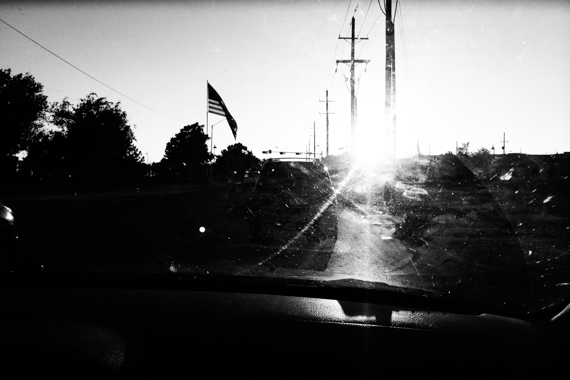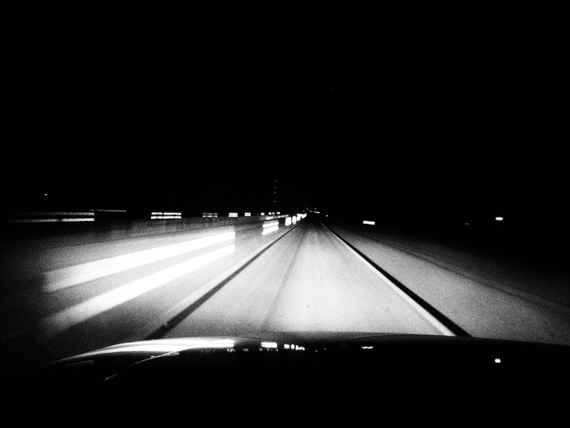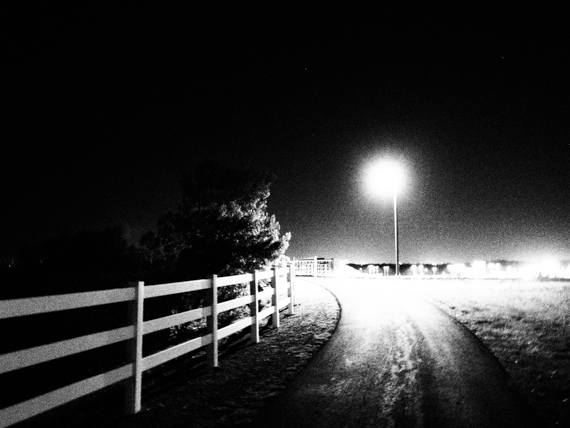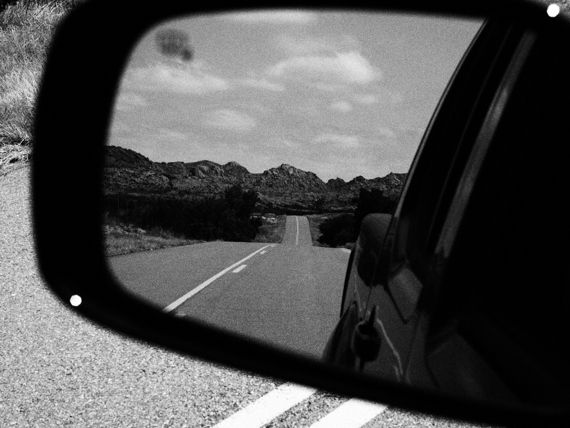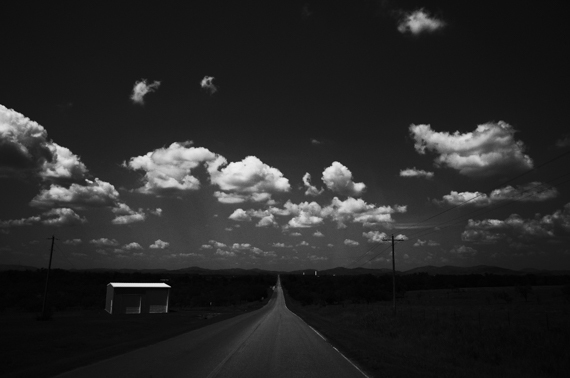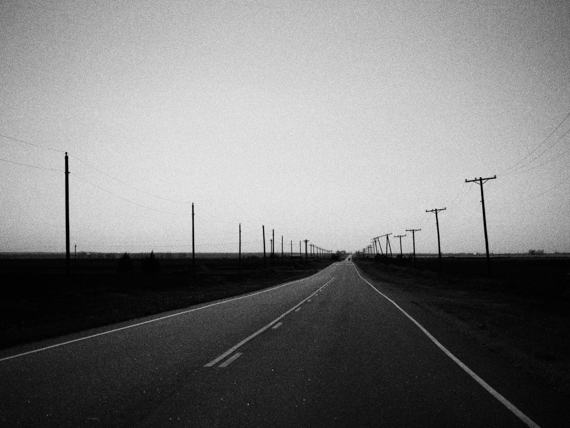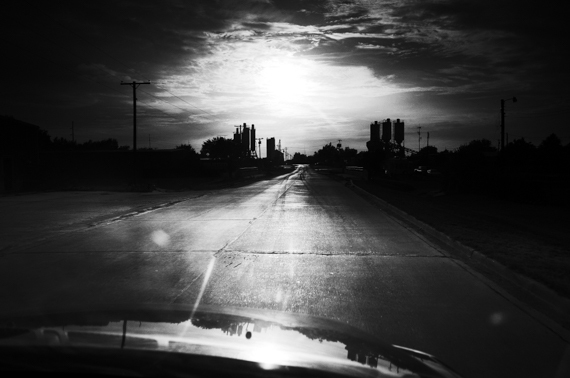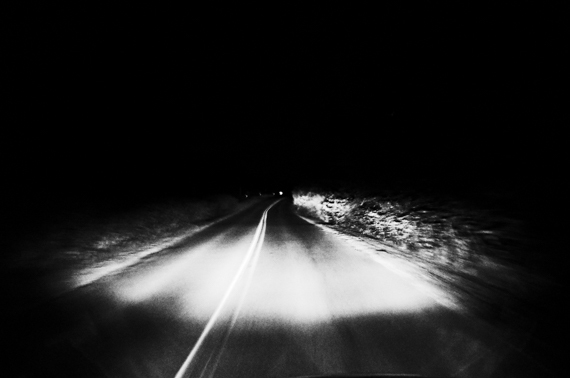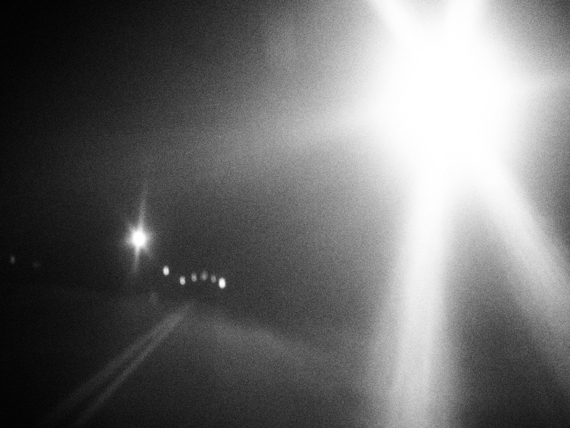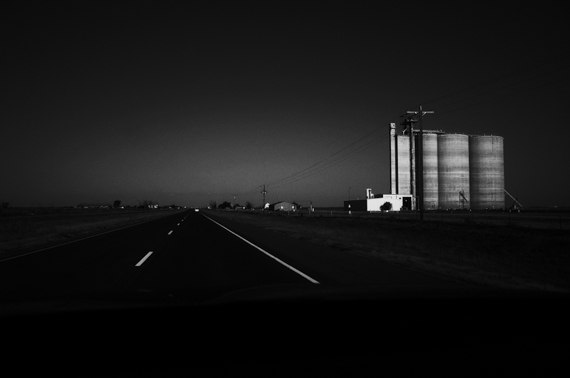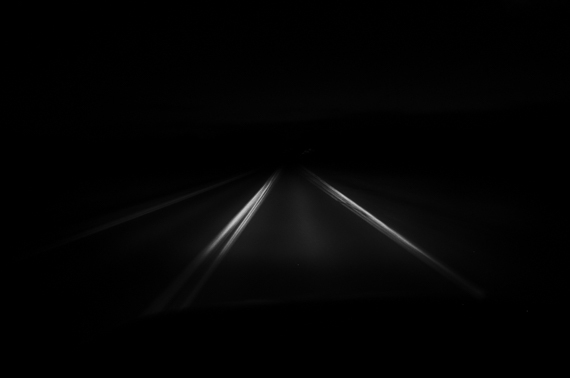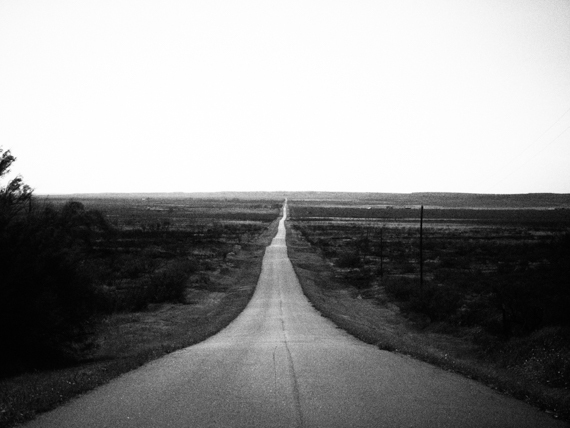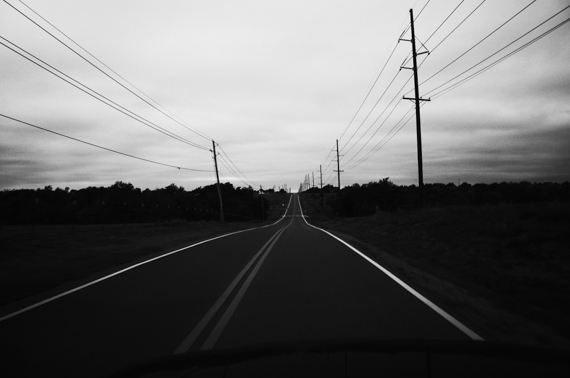I've always liked the photographs of John Hornbeck. His obvious connection to the school of Moriyama and Nakahira mean that his work exhibits grit, grain, and high contrast. All things that I love in a photograph. Then, there is also this peculiar idea of the road ahead or, occasionally, behind - as glimpsed through a mirror. There is something strangely seducing in these photographs. One after the other, they exhibit a sameness and, yet, at the same time, no two are alike. Our mind, our eyes, our imagination all work diligently to distinguish the differences, the nuances. Through this act, these photographs become highly engaging and even brave in their taunting challenge to keep looking from one to the next. John Hornbeck claims in this interview that he will never tire of this look, this approach to photography; he may well be right.
Michael Ernest Sweet: John, this is great work. It instantly reminds me of Daido Moriyama and surely that's a compliment. Your work is quite diverse, certainly more so than what we're showing here, but I wanted to focus on this series. I'm intrigued by these images. Can you speak a little about what inspired these "From the Road" photographs?
John Hornbeck: Thanks Michael, the comparison to Moriyama is a huge compliment. His work has provided more inspiration than any other photographer. The images are really more of a result of where I live and what I do for a living mixed together. I really started getting into photography because I work remote for a technology company and would end up in strange cities with nothing to do at night after everyone went home. Because of this I started taking a camera along and roaming the streets taking photos. I recently received the book Tokyo Diaries and it focuses on "the importance of the diaristic practise in Japanese photography." This was something I never really considered when thinking about my photos, at least I don't think I did, but it's really what they are. They are a diary of my daily life.
However, back at home, the concept of walking around isn't really possible since I live in a small town in Oklahoma. We have very little public transportation and everything is very spread out, so you drive everywhere. Once I started taking photos, I couldn't really stop and found that my photos really showed a representation of my overall feeling and the reality I knew, so I started taking photos of my life, which includes a lot of driving.
To circle back for a second and add to why working from home factors into this; I spend all day in front of a computer and driving in itself can be a nice therapy.
MES: Is this a theme you've been attracted to for a long time or were these photographs compiled rather quickly as a specific project?
JH: It's something I do constantly. I know that it can seem very unsafe and many have left comments about how what I'm doing is as bad as texting while driving. However, it's a very unconscious thing and I have a very small camera setup, so it's a split second that's totally uncomposed and not really thought about.
MES: The idea of "shooting the road ahead" is somewhat ubiquitous in photography. We've all seen this type of image before whether in a Moriyama book or simply in some photographers flickr stream. What do you suppose the attraction is with this type of scene?
JH: I'm not sure really. I know for me it's part of my overall view of things and as I've developed more of an understanding of my photography, I get why I do it. For me life is constantly speeding ahead and you typically only have one thing in focus or maybe nothing at all, and everything else is just flying by in a blur. As I live in a rural area, I spend a lot of time behind the wheel making this a common scene for me. Maybe it's like that for others as well, if you're trying to represent or find meaning through your photography, you document what's around you or scenes that are familiar.
MES: Do you think we can ever get bored of this approach. That is, will you reach a point where you say, "I have enough of these photos"? I looked through several dozen of these on your site and, personally, I didn't get bored. I'm not sure if I can explain why, but I didn't. Why do you suppose that is?
JH: I don't think I will get bored of it. It's a constantly changing scene and most of my photos show the seclusion and loneliness of the area. It's a feeling and a scene that doesn't really go away, so I will continue exploring the subject as long as it's this way.
MES: I understand, everyday is the same and yet no two days are alike. Switching gears, I see that these are all digital images. I was surprised actually as some really look analogue. What equipment were you using and why?
JH: I primarily use three cameras, Olympus OM-D E-M1, OM-D E-M5, and the Ricoh GR. I also use my iPhone for a few photos, but I almost always have at least the Ricoh with me. As for the look, I use the native jpgs most of the time but I mess with the settings until I get the look I want. It's hard to tell which camera any given photo came from and I like that.
MES: I can tell a Ricoh jpeg from a mile away, but the Ricoh and I have had an intimate relationship for many years. Do you ever shoot analogue? I'm not trying to ignite the digital versus analogue debate here (and I think that's over; both are here to stay). Rather, I'm curious about photographers who do employ a hybrid approach. I shoot both and am happy to do so, for example.
JH: No, it's not for me. I take a lot of photos and I enjoy the act of photography as much, if not more than anything else. So I have no desire to develop my own film or pay to constantly have film developed. I would love to try wet plate at some point, but I think that's more of my obsession with Sally Mann and the photos she has created using the process than wanting to actually do it.
MES: For me there is something about analogue that will always be the "essence" of photography. I'm not sure digital will ever be able to quite "be photography". Maybe it's just me. I did grow up with film and perhaps that's where the sentimental attachment comes from. Any thoughts on this?
JH: I can understand why people enjoy film and like the process around it, but for me capturing a photo could be done on almost anything and it would be the "essence" of photography. I'm attempting to capture a small slice of time and the reality I was experiencing during that moment, a moment that will never happen again. The tool I use doesn't really matter and the idea of "purity" or a superior method doesn't exist.
MES: As I mentioned earlier, your work is rather diverse. That is, you do venture beyond the car windshield. However, there is always a similar feel to your work - a similar approach to the image. The photographs are usually dark and gritty with a cinematic quality. Quite similar to a lot of my own work actually. Can you speak to this approach a little?
JH: The approach is a mixture of things. We can start with my outlook on life. I've always been accused of being a very black and white person, something either is or it isn't. My photos represent this, they are a very high contrast or black & white (most of the time). I mentioned some of this earlier, but I also feel like life moves at a quick pace, things flying by in a blur, with maybe one thing holding your focus and my photos represent this as well. There's also the fact that the world is a pretty dark place, things aren't all happy and great. I work in an industry obsessed with money and we have some of the smartest members of our generation focusing their time on how to get people to click on an ad instead of working to improve the world. I love technology and love the startup world, but I'm also a realist about the world many of my peers are doing. My photos represent this outlook.
MES: Who are some of the photographer (both classic and contemporary) who inspire you the most?
JH: Takuma Nakahira's essays and photos from For a Language to Come have had the most impact on my work. Daido Moriyama provides a constant stream of motivation. Sally Mann's work really hits home, I think this is due to me having 3 daughters and them being constant subjects of my photos. Nick Knight is probably the most creative photographer working today in my opinion, the work the he does at Show Studio blows me away and has had me looking into creating films more and more. The man who I consider one of the greatest photographers of all time and that's Richard Avedon. He had the ability to pull emotions out of people that maybe they didn't even know was there. Last would be my fellow members in noise, a small photography collective that I'm part of.
MES: I see you've used the Ricoh GR Digital for a lot of this work. I used the GRD IV for my entire body of work in "The Human Fragment". That camera is a legend. It's really unique in terms of a digital camera. I used the new GR and was quite unimpressed, mostly because of the lack of a hybrid focusing system. That loss has slowed things down greatly. Any thoughts on this camera? On the new generation GR?
JH: I've never used any of the others, the GR is an amazing camera for me. The snap focus functionality set to infinity has produced great results while driving.
MES: I know my questions are a little all over the place, but I just go with what pops into my head. I wanted to talk about location. Many people who are located in rural areas of the country like yourself see this as a disadvantage. Those of us like myself, who are stuck in huge cities, long to get out into nowhere land - to make photographs of the open road. How do you feel about your location and making photographs? Do you ever long to be elsewhere?
JH: Great question. A lot of my work deals with loneliness and isolation. Due to my field of work and my interests, I'm not the easiest guy to strike up a conversation with. Even more so when I happen to live in Southwest Oklahoma. So most of my time is spent alone outside of my direct family. It's a place where I always dreamed of leaving as soon as I could. But now that I have a family and my parents (both mine and my wife's) live here, it's not a place I plan on leaving anytime soon. There is that tension though, all of my friends and co-workers are far away, so there is often that longing to travel and be somewhere else. Thankfully my job allows me to travel to major cities a few times a year and spend about a week at a time there. For instance, I'm currently in Seattle for work.
MES: Mark Cohen, with whom I'm sure you are familiar, made a long photographic career out of a very small rural town (except for five minutes in Mexico) and yet produced amazing work. I think this is because we, the viewers, see something exotic in the unknown. For many of us this small town "nothingness" is indeed the unknown. Do you think your own work benefits from this?
JH: I often get comments on photos from people "longing for the open road" or how some of my shots contain no power or phone lines. Most of those shots are within 10 minutes of my house. However, if you go 10 minutes in the other direction you are in the middle of the largest army artillery training base in the US, so the town is small but not tiny. I also get comments from residents regarding the loneliness that comes across in my photos, so I'm not sure it's completely the location. I think it might be just as much my outlook on life, mixed with the area in which I'm in.
MES: What are you currently working on?
JH: I have a few projects brewing. I just finished shooting what will become a book of Lawton, OK and many of the major places in it. Maybe not major to outsiders, but things that are important to residents. I also have a couple of self-published zines on the way, one documenting the time that I've spent in Las Vegas, and one for Boston and Cambridge. Outside of that, I have also recently started painting and have really been enjoying it so far.
MES: John, thank you for taking the time to speak with us. This series is great, like all your work. I think many of us will never quite see the open road ahead of us quite the same ever again. And, may the road rise up to meet you.
JH: Thanks Michael, it's always a pleasure to talk to you.
John Hornbeck lives in Lawton, OK with his wife Rachel and his three daughters: Cherish, Kaileigh, and Olivia. Follow him on Twitter @hornbeck or on Flickr and you can also find him through his website.
Michael Ernest Sweet is a Canadian writer and photographer. Follow him on Twitter @28mmphotos or through MichaelSweetPhotography.com.

